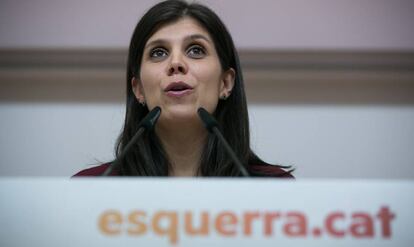Grassroots members of Catalan Republican Left back plan to negotiate with PSOE
Participants in the poll were asked whether the pro-independence party should reject the investiture of caretaker PM Pedro Sánchez if there is no prior deal for talks over the situation in Catalonia


A Catalan separatist party whose leader is in prison over the 2017 independence drive in the northeastern Spanish region could hold the key to a new government in Spain. But support will depend on Madrid’s openness to political talks.
It must be a dialogue without any conditions or excluded topics
Laura Borràs, JxCat
Following the repeat general election of November 10, which gave an inconclusive victory to the Socialist Party (PSOE), caretaker Prime Minister Pedro Sánchez has been trying to secure enough parliamentary support to get himself confirmed in the post at an investiture vote. Failure to do so could push Spaniards to the polls again in a country that has seen four national elections in as many years, reflecting the new political fragmentation in place since the traditional two-party system came to an end.
Although Sánchez has reached a preliminary deal with the anti-austerity Unidas Podemos party for a coalition government, he still needs the support of other parties, or at least an abstention, to be sworn in as prime minister at a two-round investiture vote that is expected to take place in the coming weeks.
The Catalan Republican Left (ERC), which picked up 13 seats in the 350-strong Spanish Congress, is willing to consider abstaining, but only if Sánchez first agrees to create a “negotiating table” to address what it describes as Catalonia’s “political conflict with the state.”

ERC leaders have been publicly defending an abstention in exchange for political talks. In an internal survey of grassroots ERC members, 94.6% expressed support for this strategy after answering the question: “Do you agree with rejecting Pedro Sánchez’s investiture if there is no previous agreement to address the political conflict with the state through negotiations?” Turnout was 70% in a pool of 8,500 people.
The result lends additional support to the position of ERC leaders, compared with more radical factions of the separatist movement that would rather prevent the formation of any national government that refuses to accept an official independence referendum in the region.
“Pedro Sánchez has to make a move,” said ERC spokeswoman Marta Vilalta after the results of the non-binding poll were released. “He needs to choose between a negotiating table or a failed investiture. The ball is in his court.”
Oriol Junqueras
The abstention-for-talks strategy is also supported by Oriol Junqueras, the ERC leader who was recently convicted to 13 years in prison for sedition in connection with the 2017 breakaway attempt – he was the deputy premier of Catalonia at the time, serving under ousted premier Carles Puigdemont.
We will reject the investiture unless there are negotiations to resolve the conflict between Catalonia and Spain
Oriol Junqueras, ERC
“The situation has changed a lot since July [when an earlier investiture attempt by Sánchez failed in the wake of the April 28 election], and now it is very clear that we will reject the investiture unless there are negotiations to resolve the conflict between Catalonia and Spain. When this happens, we will reconsider our attitude,” said Junqueras in an interview with the Basque radio station Euskadi Irratia from inside Lledoners penitentiary. “We don’t want gestures or attitude changes, we want demonstrable steps.”
Vilalta said there are four conditions: the negotiations must be between both governments; negotiators must be able to “talk about everything;” there has to be a clear calendar; and guarantees must exist that any resulting agreements be honored.
Vilalta said that while this still falls below their ultimate goals, “it could be the first step to find a democratic solution to the conflict. We are taking the first step, and fully trust that other groups will also walk along this path.”
Puigdemont’s position
The other Catalan separatist party with a significant presence in the Congress of Deputies, Together for Catalonia (JxCat), on Monday produced its own list of demands in exchange for an abstention to help Sánchez form a government.
“There must be a dialogue without any conditions or excluded topics, one that acknowledges the Catalan institutions as interlocutors, with [Catalan premier Quim] Torra at the helm,” said Laura Borràs, the party’s leader in Madrid.
JxCat, which has eight lawmakers in Madrid, is keen to join the push for negotiations with the PSOE, an initiative that has so far been monopolized by ERC. Puigdemont’s party also wants an international mediator present at the talks, and some additional gesture of goodwill from the Socialist Party, such as withdrawing legal challenges that were filed against Catalan parliament leaders for allowing the regional chamber to discuss right-to-decide motions.
“We are asking for tangible, concrete solutions that respect what citizens voted for,” said Borràs at a news conference in the Catalan parliament.
English version by Susana Urra.
Tu suscripción se está usando en otro dispositivo
¿Quieres añadir otro usuario a tu suscripción?
Si continúas leyendo en este dispositivo, no se podrá leer en el otro.
FlechaTu suscripción se está usando en otro dispositivo y solo puedes acceder a EL PAÍS desde un dispositivo a la vez.
Si quieres compartir tu cuenta, cambia tu suscripción a la modalidad Premium, así podrás añadir otro usuario. Cada uno accederá con su propia cuenta de email, lo que os permitirá personalizar vuestra experiencia en EL PAÍS.
¿Tienes una suscripción de empresa? Accede aquí para contratar más cuentas.
En el caso de no saber quién está usando tu cuenta, te recomendamos cambiar tu contraseña aquí.
Si decides continuar compartiendo tu cuenta, este mensaje se mostrará en tu dispositivo y en el de la otra persona que está usando tu cuenta de forma indefinida, afectando a tu experiencia de lectura. Puedes consultar aquí los términos y condiciones de la suscripción digital.








































